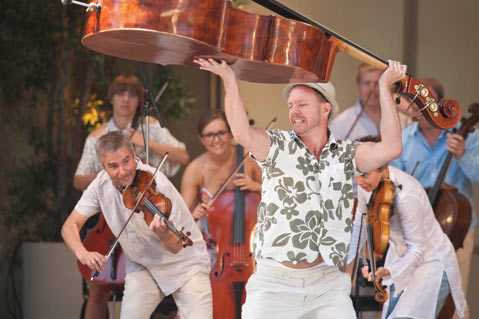Ojai Music Festival Reviewed
Leif Ove Andsnes Brings Wit and Power to Libbey Bowl

When Leif Ove Andsnes, the immensely gifted pianist who served as music director of the 66th annual Ojai Music Festival, stood to acknowledge the applause at the end of the Festival’s final day, he hesitated before issuing his first thanks, which went to the audience. “This is truly the world’s best audience,” he said, and a ripple of happy laughter passed through the larger wave of applause that followed his remark. The audience for the Ojai Music Festival is indeed among the most intense, the most passionate, and the most discerning to be encountered anywhere, and not the least of its charms is an undercurrent of self-aware humor. Moments later, when Andsnes and his partner for the two-piano transcription of Stravinsky’s Rite of Spring, Marc-André Hamelin, reappeared onstage for their encore, Stravinsky’s “Circus Polka,” they donned matching green clown noses, joining in the general spirit of light-hearted silliness.
This is not to say that the Ojai Fest is superficial or frivolous — in fact, it’s far from it. The Norwegian Chamber Orchestra may have put on some kooky colorful outfits for Sunday’s matinee performance, and they may have done a collective kick step when they left the stage for the last time on Sunday evening, but otherwise they were all steely precision and professionalism. Highlights of their multiple appearances included Friday night’s arrangement for string orchestra of Leos Janáček’s string quartet “Intimate Letters” and Sunday evening’s exquisite rendering of Debussy’s Danses sacrée et profane, a delicate and evocative piece that provided an excellent opportunity for harpist Ida Aubert Bang to shine.
Of the three major concerts that I attended, the 11 a.m. performance on Saturday, June 9, was the most memorable. The program, which put Alban Berg’s music into dialogue with some extraordinary songs by Richard Wagner, was perfectly balanced. In the first half, the Norwegian Chamber Orchestra set the tone with a dark and dissonant piece by Eivind Buene, paving the way for mezzo-soprano Christianne Stotjin, who alternated with clarinetist Martin Frost in a set that paired five of Wagner’s Wesendonck Lieder with Berg’s Four Pieces for Clarinet and Piano, Op. 5. Frost is one of the world’s most acclaimed reed players, and he was mesmerizing, but the real excitement came from Stotjin, who absolutely claimed these delicious, long-lined, and complex lieder as her own.
The Friday-night concert, which featured the aforementioned Janáček’s, was mostly given over to “Im wunderschönen Monat Mai,” an arrangement by Dutch conductor and pianist Reinbert de Leeuw of 21 songs by Robert Schumann and Franz Schubert. The sound for this was not perfect, as the notes from de Leeuw’s open-topped grand piano seemed at times to float off into the night before reaching the seats, but there was much to admire both in the music, which was ingenious, and in Lucy Shelton’s performance of this highly demanding material. It’s possible that the original performer scheduled for this piece, the German actress Barbara Sukowa, might have done more to deliver the necessary theatrical touches, but it’s my guess that these arrangements would fare better in an indoor setting. Ultimately, the great value of this extraordinary festival was upheld throughout the weekend, as passionate listeners met with challenging works through the medium of some truly inspiring performances.



